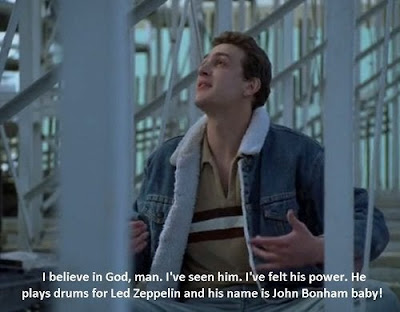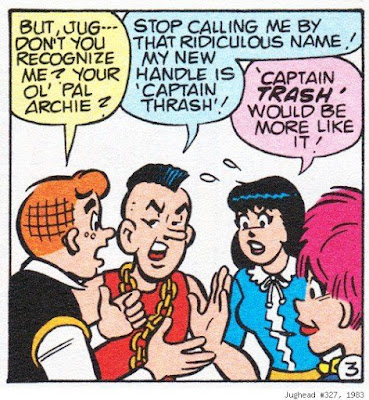GOOD MUSIC BY BAD PEOPLE, OR "LED ZEPPELIN" BY BOB SPITZ
Good art can be made by terrible people. In fact, I assume that just about every famous person is a bit of an asshole. Like, how did they get to be famous in the first place? Probably by screwing over friends and family. And to keep that fame? You've gotta do some shady stuff.
So I'm not too surprised when revelations of shittiness about favorite performers come out, and just hope it's sort of equal to biographies of historic people where you get a, "Well, they were marginally less racist than most people at the time," and sort of live with that.
My moral relativism aside, man, were the dudes in Led Zeppelin dicks.
I sort of knew a bit of this from reading "Hammer of the Gods" years ago but all the groupie abuse and screwing prepubescent girls hit harder this time. Maybe I'm older and more mature? Maybe I've known women with histories of sexual abuse? Maybe I see what 13 and 14 year old kids are really like and probably shouldn't have older English guys messing with them?
Whatever has changed with me (or possibly the times), a lot of Bob Spitz's mammoth band biography "Led Zeppelin" is just kinda gross, and hard to reconcile with as good as Led Zeppelin could be musically.
In broad strokes, session guitarist Jimmy Page assembles a band out of the best musicians available, making sure they love the blues but aren't overly precious about them. He also picks up a monster-sized manager straight from a Guy Ritchie movie.
The press hates them, painting them as money-obsessed cretins butchering the blues, England is lukewarm, but America loves Led Zeppelin. Well, radio and concertgoers love them. The American press disdains them as well, but the band is enormous, at one point accounting for about 30 percent of their record label's sales.
Led Zeppelin tours constantly, especially in America, where they're free to indulge in bad behavior away from their families. The tediousness of the road, a fondness for harder drugs by half the band and management as well as personal tragedies threaten to derail the band. On the eve of a back to basics tour (previous tours featured a Spinal Tap-ish Stonehenge, only regular sized, as well as solos that would regularly stretch songs to 30 minutes), drummer John Bonham dies and the band calls it a day.
Spitz keeps things flowing well - you'd be surprised how fast this almost 600 page tome can fly by. He deftly illustrates the hunger in England for rare American blues recordings, the lifestyle of a session musician, and just why so many bands were a product of English art school.
 |
| Maybe skip some of this book, Freaks and Geeks dude |
Of course, salacious details of hotel trashing, mountains of cocaine, an interest in black magic and groupie abuse make for even faster reading; even as it gets revolting, it's hard to turn away.
And damn, could it get bad. Drummer John Bonham sounds like a fucking monster - while he pined for his family back in England, in America he'd get "overrefreshed" to use Spitz's term and do things like punch a woman in the face because he thought she was laughing at him or commit at least two documented attempted rapes, not to mention just run-of-the-mill sexual and physical assault.
And then there's the bands love of underage fans. "If you were Led Zeppelin, you had the pick of the litter -- mostly junior high school girls from the Valley, Palos Verdes, or Orange County."
"Led Zeppelin had lost all sense of what they were -- a rock 'n roll band, not the ridiculous fantasies they portrayed themselves on the screen. Their self-importance had taken over their identities. There were groups like the Beatles and the Who who chafed over how they were cut off from the fans; Led Zeppelin welcomed the alienation. They'd become imperious, overweening, "at war with everybody" -- the press, the filmmakers, the record company, even fans. Their MO was to steamroll over anyone who veered into their gilded orbit. They no longer existed as mortals; they had loyal subjects -- handlers, retainers, procurers, muscle, and security. They existed behind glass, bulletproof glass. During an interval when they could have shown some humanity and repaired this image, they chose to remain aloof instead."
Strangely enough, this bubble didn't help the shows - I don't think I've ever read a book detailing so many bad performances. I would have thought seeing Led Zeppelin in the '70s would have been like seeing a well-oiled machine, but apparently it was more like 50/50.
Can you separate the art from the artist? Or give people passes for living in different times? All art is made by imperfect people, but can reprehensible people, through the art of creation, overcome their shittiness? I dunno, I guess that's what we've all got to work out for ourselves.
Sex/Drugs/Bad Behavior
9/10. And pretty grossly so at points.
Opens in Media res?
Yep. Opens with a hitchhiker getting blown away by seeing Led Zeppelin live and rededicating himself to his band. Unfortunately, that band was Aerosmith.
Could We Hang?
Jesus, no. Although Robert Plant seems like a nice enough guy.
You Might Remember Me From, or, My Totally Biased View of the Author's Best Stuff:
C'mon, you know all the hits. If you grew up in the South or Midwest anytime between 1970 and 1989, you had a station that had a "Get the Led Out" hour. I'm more of a 'monster riff' than a 'complex solo' guy, so III is the album I'm going for if I'm listening straight through.
Percentage of Music in the Bio
Let's say 70 percent. In between screwing middle school girls and trashing hotel rooms, Spitz goes into some detail about recording sessions and concerts, conveying just enough technical information to still be interesting to non-musicians.
Buy, Borrow from the Library, or Pass
Strong borrow. But be aware, you might hear their music differently afterwards.


Comments
Post a Comment